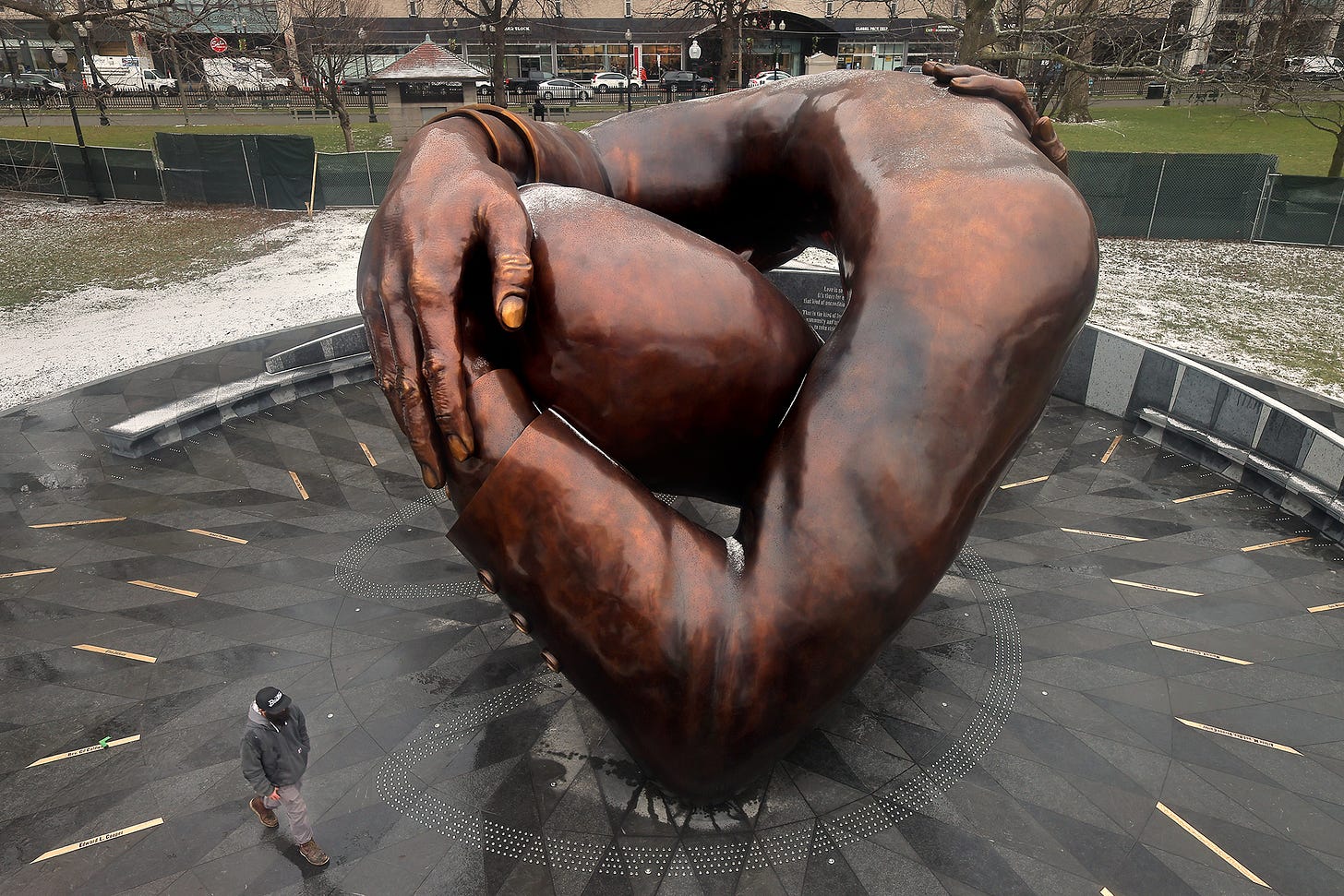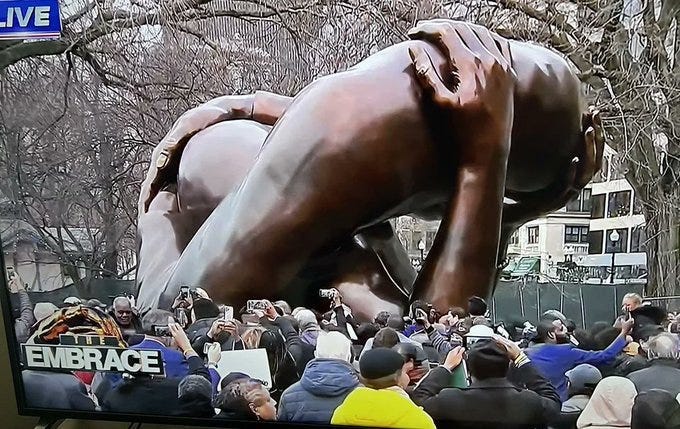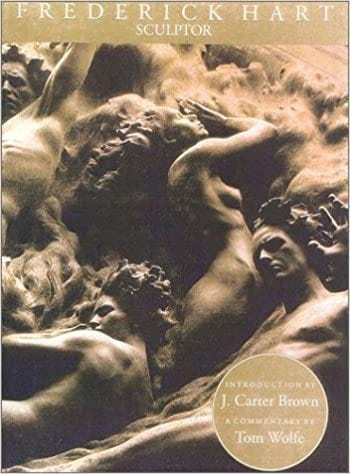MLK Deserved Better. He's Not Alone. (Corrected version.)
Plus: The latest Santos ripoff
Embrace, the Dr. Martin Luther King Jr. memorial sculpture at Boston Common. (Photo by Lane Turner/The Boston Globe via Getty Images)
In today’s Morning Shots: The GOP’s fascination with the Italian right; Kristol’s dispatches from Berlin; Marjorie Taylor Greene and Paul Gosar get their committees; and the latest George Santos ripoff.
But we start today with some thoughts about public “art.”
**
Megyn Kelly thinks it looks like a “giant penis”. Coretta Scott King’s cousin calls it a multi-million dollar “masturbatory metal homage to my legendary family members,” while the Wapo’s Karen Attiah thinks that from some angles “the statue for real looks like one person is performing disembodied oral sex.”
She accompanied her tweet with this image:
“No matter how much I try, I can't unsee it” she wrote. “I don't think MLK would have wanted us to be thinking about cunnilingus on his birthday. Thanks, Boston.”
And these were some of the milder reactions to the new 22-foot-tall bronze statue in Boston Common that is supposed to honor Martin Luther King Jr.
As usual with modern public art, explanations are in order. The artist, Hank Willis Thomas, says that he was inspired by a photograph of MLK and his wife after the civil rights leaders won the 1964 Nobel Peace Prize.
The result, however, is a monument sans either MLK or Coretta. Just the arms.
Thomas explained: “This work is really about the capacity for each of us to be enveloped in love, and I feel enveloped in love every time I hear the names and see the faces of Dr. King and Coretta Scott King.”
Ah, the faces. Which are not depicted in the headless, bodiless artifact.
Much of the criticism focused on that depersonalization. “There is nothing radical about the disembodied, de-racialized Embrace statue,” wrote Attiah. “It is sending a whitewashed, multi-million dollar message --- that MLK and Coretta overcame structural racism and systematic injustice with love-- interpersonal, colorblind love.”
Despite the fact that the sculptor is an African American, Attiah complains that the monument “perfectly represents how White America loves to butcher MLK.”
Boston's Embrace statue Cherry-picking quotes about love and non-violence. While ignoring his radicalism, anti-capitalism, his fierce critiques of white moderates. MLK- in his fullness-- is still too much for them.
Coretta Scott King’s niece calls the statue “an especially egregious example of the woke machine’s callousness and vanity,”’ but thinks it may be a blessing in disguise “by exposing the insidiousness of astroturfed woke movements that have come to dominate black America. How could anyone fail to see that this was a major dick move (pun intended)….”
But MLK is hardly alone.
Indeed, the late Tom Wolfe painstakingly chronicled the uglification of a public art, as the art world spurned the notion of art that represented the human form as something beautiful. His 1975 book, “The Painted Word” is a masterpiece of art criticism/deconstruction, and for decades he continued his rhetorical war against what he called “the most ludicrous collapse of taste in the history of the American Art World.”
In the 1950s and 60s, Wolfe recounted, America’s art “village” was “swept by a vogue for abstract art,” which became a sort of new orthodoxy. So we were inundated with corporate HQs adorned with “twisted extrusions in the Isamu Noguichi manner and boluses with holes in them à la Henry Moore.”
This, Wolfe notes, became known as the “Turd in the Plaza school of sculpture,” and you can probably cite half a dozen examples in your hometown, so ubiquitous did they become. (Not surprisingly, some Twitter critics, who eschewed sexual references, compared “Embrace” to a giant turd.)
In the 1970s, the art world moved on to “the sculpture of object-ness” in which, Wolfe explained, “sculpture was not supposed to evoke, much less represent, anything other than its ‘weight’ and ‘gravity’ as an object.” This became all the rage, leading to “one howler after another,” most infamously Hartford Connecticut’s $87,000 pile of rocks by Carl Andre. The city’s residents sensibly “hooted and jeered,” but they were assured by their betters that this was indeed public “art.”
There were notable exceptions to all of this — sculptors like Frederick Hart, who continued to produce powerful and deeply human works of art like the Three Soldiers at the Vietnam Veterans Memorial, and the magnificently beautiful Ex Nihilo at the National Cathedral, depicting the emergence of man from the swirling chaos of creation.
But artists like Hart were largely ignored by the fashionistas of the art establishment, who regarded the idea that humans were created in the image of God as “so infra dig [that] the dealers, curators, collectors and artists who establish fashions don’t even bother to condemn it.”
This flight from beauty was accompanied by a flight from the idea that art should also display mastery and skill.
“By 1982,” Wolfe wrote in the NYT, “no ambitious artist was going to display skill, even if he had it.”
The great sculptors of the time did things like have unionized elves put arrangements of rocks and bricks flat on the ground, objects they, the artists, hadn't laid a finger on (Carl Andre), or prop up slabs of Cor-Ten steel straight from the foundry, edgewise (Richard Serra); or they took G.E. fluorescent light tubes straight out of the box from the hardware store and arranged them this way and that (Dan Flavin); or they welded I-beams and scraps of metal together (Anthony Caro). This expressed the material's true nature, its "gravity" (no stone pictures floating in the air), its "objectness."
This was greatness in sculpture.
As Tom Stoppard put it in his play "Artist Descending a Staircase," "Imagination without skill gives us contemporary art."
And then came a rush of the brutally awful.
By the late 1980s, wrote Wolfe, the art village had begun to embrace a style of sculpture he called I.C.U (for Intensive Care Unit), “in which self-loathing and loathing of the human species reach a nadir.”
So we got:
“An incinerated and flagellated corpse of a tiny woman with her bloody spinal column popping out through the skin of her back….”
“A bowl of plums, each plum possessing a screaming human mouth with purple lips and gnashing purple teeth…”
“The lower half of the torso of a man wearing tighty-whitey undershorts, ribbed socks and Topsider sneakers with gaping holes in his legs and left buttocks that look like crosses between abscess craters and plumbing drains…”
”The blackened figure of man, with no eyes, no nose, no mouth, no ears, hogtied in a jack-knifed position.”
And none but Philistines dared to ask: Why does it have to be so ugly?¹
So MLK should not take the Boston debacle personally. He deserved better. But then, so do we all.
**
(I imagine that some of you may have a very different take about both “The Embrace” and the uglification of art in general, so I’m going to be interested in reading your comments. Have at it. )
It’s MTG’s House
As recently as 2019, Republicans were able to draw lines. After Iowa’s notorious Steve King publicly embraced white supremacy, the GOP hesitated only momentarily before kicking him off committees and, ultimately, consigning him to political oblivion.
What a difference a few years makes. Via NBC:
The GOP Steering Committee, which doles out committee gavels and seats, voted to give Greene and Gosar spots on the Oversight and Accountability Committee, which plans to launch numerous investigations into President Joe Biden and his administration…
Greene also won a seat on the Homeland Security Committee, which Republicans will use to focus on border security and to investigate Homeland Security Secretary Alejandro Mayorkas.
The folks at the Defend Democracy Project remind us who we’re talking about here:
Rep. Marjorie Taylor Greene Is A Far Right Conspiracy Theorist Who Was Part Of The January 6 Plot And Now Serves On The Homeland Security And Oversight Committees... In addition to her other conspiracies, racist remarks, and wild accusations, Greene relentlessly spread lies about the 2020 election being “stolen” and was a key figure working in Congress to overturn the results in Donald Trump’s favor….
Rep. Paul Gosar Plotted With Trump To Overturn The 2020 Election. Rep. Paul Gosar was a ringleader in the plot to overturn the election far beyond his vote not to certify electors on January 6….
Gosar has a long history of collaborating with white nationalists and far right extremists, and several of his own estranged siblings have referred to him as a “traitor to his country” and called for his removal from the House.
ICYMI: George Santos Took $3K From Dying Dog's GoFundMe
No, there’s no bottom to this guy.
“Two New Jersey veterans say George Santos promised to raise funds for a lifesaving surgery for a service dog — then disappeared.”
The dog died.
Quick Hits
1. Toward a True ‘Zeitenwende’
Bill Kristol’s reflections on his recent visit to Berlin.
If the West decisively defeats Russian imperialism in 2023, it would not only be a turning point for European security and for the transatlantic alliance—the groundwork would be laid for a true Zeitenwende for the post-Cold War world. After a couple of decades of retreat on the part of the forces of liberal democracy, liberal democracy would have pivoted not just to fighting back, but to shaping a better future for the world.
2. The Fed and the House Are Both Bringing on a Recession
Desmond Lachman in today’s Bulwark:
There is both good and bad news about our country’s economic outlook. The good news is that the Federal Reserve seems to be winning its fight against inflation. The bad news is that it appears likely that the cost of victory will be a recession caused by the Fed engaging in monetary policy overkill coincident with a looming fight over increasing the debt ceiling. The timing is perilous.
3. The Republican infatuation with Italy’s new right wing
Make sure you check out Joe Perticone’s new newsletter, Press Pass (and subscribe):
When Meloni came to power, Republicans in the United States were elated:
“I’m so excited,” said Kari Lake, the election-denying failed Arizona candidate for governor, in an appearance on Tucker Carlson. “This is someone I can relate to.”
Former Trump confidant Roger Stone listed Meloni on his annual best-dressed list, saying the PM is “not a fascist; she's a fashionista.”
Meloni also earned swift praise from the Senate’s hard right, such as Tom Cotton and Ted Cruz, who quote-tweeted a video of Meloni speaking with a one-word caption: “spectacular.”
Cheap Shots
1 Actually, it was University of Chicago art historian Barbara Maria Stafford who looked about her at the state of what passed for “art” and asked: “Why, in order to be taken seriously, do things have to be ugly.”










Spread the story about Santos stealing from a dying dog. If there's one story about Santos that will get traction, this is it. Who cares about his background or his (lack of) ethics? HE STOLE FROM A DYING DOG!! Get rid of him, McCarthy! (It just might work.)
I'm a great fan of the Bulwark and of you, Charlie, but this is hands-down the most reactionary thing you have written since I started following your newsletter a few years ago. Where to start?
I write from Boston, and I can report that The Embrace--like most sculptures--is meant to be experienced in three dimensions. Judging its effect from a few cropped images is unfair. Once again, step away from Twitter.
In the context of the art of the past 80 years, The Embrace is actually a very conservative work. It is monumental, bronze and redolent of exactly the kind of figurative detail that your boy Frederick Hart revels in.
THIS is when you side with Karen Attiah? You, of all people, are on Team Attiah in asking that a sculpture placed in the heart of a publicly owned space celebrate one person's anti-capitalist, radical views? Really?
There are genuine problems with contemporary art. The art world long ago (as in, before you were born) stopped valuing craft over concept, but this was a natural response to a world where mechanical tools like photography could perform work formerly done by artists. We can't turn back the tide of ideas, but we can ask that art demonstrate both skill and meaning. The best contemporary art manages to do that. I would urge you to put down your Tom Wolfe and get out to some galleries to see for yourself.